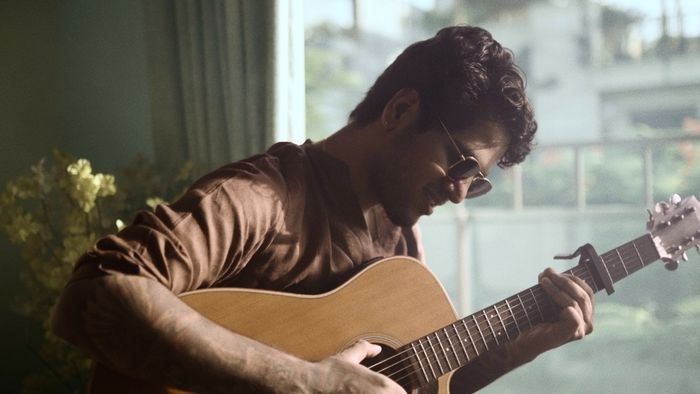From Guwahati to global fame: BABA’s sonic journey
Abhiruk Patowary, known as BABA, has transformed from a young boy in Guwahati to a global music star. His journey began with a piano key at age 8 and now reaches cities across India.

- Aug 17, 2024,
- Updated Aug 17, 2024, 12:45 PM IST
A small boy sits at a piano in Guwahati, Assam. It's 2009, and 8-year-old Abhiruk Patowary's fingers hover over the keys. He presses one, then another. A melody emerges, hesitant at first, then growing bolder. This is the moment Abhiruk - now known as BABA - first felt his existence.
"It was the first time I felt a higher level of existence. I exist, basically," BABA recalls, his eyes distant as he remembers that pivotal moment.
The name BABA, written in all caps, isn't some grand artistic statement. It's a simple, intimate connection to his roots. "My mother calls me Baba," he explains. "Everybody in my home calls me Baba." When he went to Berkeley College of Music, introducing himself as Abhiruk proved challenging for his peers. "Nobody could remember because it's too difficult to pronounce. So I just started saying Baba, and that just stuck. It felt very authentic."
In a house filled with the echoes of his parents' local fame, young Abhiruk struggled to find his place. "Everybody called me his son or her son. I wasn't a very bright student," he admits. The piano became his voice, his identity. In school, he transformed from an anonymous face to "the guy who plays the piano."
But one instrument wasn't enough. Soon, the rhythmic call of drums beckoned. "I wanted to hit something. I'm not an athletic person, but I needed to take the energy out. The drum sounded very good," BABA explains. Guitars followed, their strings singing under his fingers. Then came the bass, its deep tones resonating in his chest. Most recently, the saxophone joined his musical arsenal, its brassy notes adding yet another colour to his sonic palette.
In 2014, Delhi's bustling streets became BABA's new stage. At just 13, he was already a professional musician, his performances painting the capital's music scene with fresh hues. His first major project, "Gaia," was born in 10th grade, a metal album that taught him the art of collaboration.
2019 saw BABA crossing oceans to Berkeley College of Music. There, surrounded by aspiring musicians from around the world, he honed his craft, double-majoring in music production and engineering, and contemporary writing and production.
But BABA's art isn't confined to sound alone. His music videos are a riot of colour, each frame carefully crafted to match the mood of his songs. "My music is intricate, very colourful," he says. In "Hold Me Tonight," anxiety comes alive in shifting hues. "We start with darker colours, then slowly progress as the lyrics unfold," BABA explains, revealing the thoughtful process behind his visual storytelling.
As BABA's musical journey progressed, his creativity expanded beyond instrumental pieces. When asked about the first song he ever wrote, BABA's mind wanders back to his early days. "The first songs that I wrote were very instrumental," he recalls. "At that time, I really liked stuff like Indian Ocean and Coke Studio. I was in 8th or 9th grade. I tried a lot of Indian-inspired instrumentals, but which had a lot of Western stuff."
But before the melodies came the words. BABA's first foray into writing was deeply personal. "I can give you the first poem that I wrote," he offers. "I was very young, around 11 or so. I had pets and I had to give them away because of allergies. I wrote a thing for them." His voice softens as he adds, "Everything has been very emotionally driven. I would say the vision making of why I'm doing it."
On stage, BABA is a whirlwind of energy. Sweat glistens on his brow as he moves from instrument to instrument, his music washing over the crowd in waves. "Seeing people dance and smile - that feeling is very rewarding," he says, his words almost drowned out by the phantom roar of an imaginary audience.
Now, BABA is bringing his audiovisual spectacle to cities across India. From the narrow lanes of Delhi to the coastal breeze of Kochi, from his hometown Guwahati to the tech hubs of Hyderabad and Bangalore, his music is painting the country in new shades.
As he looks to the future, BABA's mind is filled with the warm glow of neon and the pulsing beats of the 80s. "I'm diving into that 80s nostalgia. Old school synth sounds mixed with drums," he reveals, his eyes lighting up at the possibilities. His influences span decades, from The Beatles and Led Zeppelin to more contemporary artistes. "I really like The Weeknd," BABA admits. "The Weeknd is killing it. One of the best artistes. My new music is very Weeknd-like, which is yet to be released."
Despite his success, BABA faces challenges, particularly in his choice to sing in English, and not other languages like his mother tongue Assamese. "My dream is to become a global star. When I tell people, 99% ask if I'm crazy," he reveals. "In India, everyone asks why I'm not singing in Hindi." Yet, he remains committed to his artistic vision. "I've been writing in English all my life. It's authentic to me," he explains.
From that first tentative piano note in Guwahati to the complex symphonies he now creates, BABA's journey is far from over. As he puts it, inviting us all along for the ride, "Follow this journey with me. Let's see where it goes."